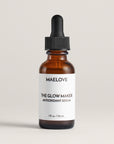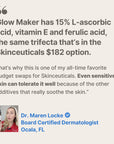



Glow Maker Vitamin C Serum
Your skin, but brighter.
Glow Maker delivers the gold-standard antioxidant complex (Vitamin C, E, and Ferulic Acid) that dermatologists trust, enhanced with soothing botanicals that make it gentle enough for sensitive skin.
✓ Powerful enough to deliver results in 30 days or less
✓ Dermatologist-tested for sensitive skin
✓ Absorbs in seconds with no unpleasant residue or strong smell
The same clinical formula luxury brands charge $182 for. We offer it at $33 because effective skincare should be accessible to more of us.


GLOW MAKER IS A POTENT VITAMIN C SERUM. You'll notice brighter skin within 30 days or less with consistent daily use.
ANTIOXIDANT TRIO (15% Vitamin C + Vitamin E + Ferulic Acid)
- Clinically proven to brighten skin tone, smooth fine lines, and shield against future sun damage.
- The same formula dermatologists have trusted for decades to bring dull skin back to life.
HYDRATION SUPPORT (Hyaluronic Acid)
- Plumps and hydrates to counteract the dryness that often comes with age.
- Keeps skin comfortable throughout the day.
CALMING COMPLEX (Aloe + Vitis Vinifera (grape seed) + Magnolia Bark)
- Botanical extracts that soothe the skin.
- Ensures you receive high-potency results without the stinging or redness common in other Vitamin C serums.
Apply right after cleansing every morning:
- Smooth a thin layer over your face, neck, and chest.
- Want better and faster results? Use morning and night.
- Layer other serums on top if using, then seal everything in with moisturizer.
✦ This lightweight, water-like formula absorbs in seconds. No sticky residue. No pilling under makeup. Just clean, immediate absorption that lets you get on with your morning.
✦✦ We recommend to start using it as soon as you receive it. The shelf life can be extended if you store it in the refrigerator.
FAQ
Glow Maker is an oil-free formula. All Maelove products are tested for sensitive skin, made in the US, vegan, cruelty-free, non-comedogenic, gluten-free, and free of parabens, phthalates, dyes, and artificial fragrances. We don't use ingredients that are banned in the EU or in the USA.
Water (Aqua), Ascorbic Acid, Ethoxydiglycol, Aloe Barbadensis Leaf Juice, Vitis Vinifera (Grape) Seed Extract, Glycerin, Sodium Hyaluronate, Magnolia Officinalis Bark Extract, Tocopherol, Xanthan Gum, Ferulic Acid, Lecithin, Disodium EDTA, Sodium Metabisulfite, Citrus Aurantium Dulcis (Orange) Callus Culture Extract, Ethylhexyglycerin, Maltodextrin, Sodium Hydroxide, Gluconolactone, Calcium Gluconate, Phenoxyethanol, Sodium Benzoate
This formula is for you if:
✔️ You want to brighten and even out your skin tone.
✔️ You want clinical-strength results without irritation (your skin is more reactive now than it used to be).
✔️ You're tired of serums that pill under makeup or feel heavy on your skin.
✔️ You want something that works with, not against, your prescription retinoid or other treatments.
Vitamin C is a multi-tasking powerhouse for your skin:
Repairs existing damage: Fades stubborn dark spots, sun damage, and post-inflammatory hyperpigmentation that's accumulated over the years.
Prevents future damage: Acts as a powerful antioxidant shield against sun, pollution, and environmental stress that accelerates aging.
Rebuilds structure: Essential for collagen production, helping your skin maintain firmness and bounce as natural collagen production declines.
Pro-Tip: If your primary concern is lines and loss of firmness, pair Glow Maker with Peptide Squad. Use Glow Maker in the morning for prevention and brightening, Peptide Squad at night for structural repair.
Together they address both surface damage and deeper structural aging. (Plus, buying both qualifies for free shipping.)
We use L-ascorbic acid (L-AA).
Why it matters: L-AA is the "gold standard" of Vitamin C because it's the most bioavailable form - meaning it’s the only version your skin can use immediately without having to convert it first.
Because L-AA is the most deeply researched and proven form, it remains the top choice for dermatologists worldwide.
We stabilize ours at a precise pH and pair it with Vitamin E and Ferulic Acid (the exact antioxidant complex experts trust) to ensure it stays potent and effective from the first drop to the last.
Glow Maker is formulated at a precise pH of 3.1 to 3.4.
Why does this matter?
According to landmark research by Dr. Pinnell at Duke University (published in 2001), Vitamin C (L-ascorbic acid) can only penetrate your skin's protective barrier if the formula is acidic enough—specifically, below a pH of 3.5.
At this "acidic sweet spot," the Vitamin C molecules stay in their protonated state, which allows them to slip past your skin's outer lipid layer and reach the deeper layers where they actually work.
Here's the catch:
If the pH is too high, the Vitamin C just sits on the surface. You get irritation without any of the brightening, firming, or protective benefits. That's why precise formulation matters. It's the difference between a serum that works and one that just stings.
The Standard:
The industry "gold standard" is Vitamin C, Vitamin E, and Ferulic Acid at a pH of 3.5 or lower. Glow Maker uses this exact formula. We charge $33. Luxury brands charge $180+.
The Difference:
We solved the problems that make most Vitamin C serums unpleasant to use. By adding grape seed, magnolia bark, aloe, and hyaluronic acid, Glow Maker is:
✔️ Hydrating instead of drying
✔️ Soothing instead of irritating
✔️ Nearly odorless (no "hot dog water" smell)
The Result:
You get the same proven results without the trade-offs. That's why more dermatologists now recommend Glow Maker. It matches the clinical standard while actually being pleasant to use every day.
Yes. Vitamin C is rated Category A in pregnancy by the FDA which means Vitamin C has been evaluated by clinical trials in pregnant women and deemed safe. The actives including Vitamin E, Ferulic Acid, and Hyaluronic Acid are all considered generally safe to use topically during pregnancy and lactation. However, it is always advisable to check with your doctor regarding skin care products and ingredients.
Customer Reviews



